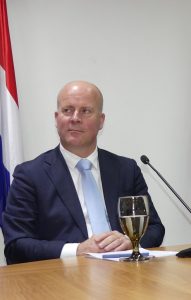Knops: Kingdom not responsible for offshore games of chance in the Caribbean
 THE HAGUE – The Kingdom is not responsible for legislation related to games of chance in St. Maarten, Aruba and Curacao. “This is not a Kingdom concern and therefore the Kingdom has no authority over the issuance and extension of permits for offshore games of chance,” State Secretary Raymond Knops (Kingdom Affairs) wrote on Tuesday in answer to questions parliamentarian Ronald van Raak (Socialist Party) submitted on January 31.
THE HAGUE – The Kingdom is not responsible for legislation related to games of chance in St. Maarten, Aruba and Curacao. “This is not a Kingdom concern and therefore the Kingdom has no authority over the issuance and extension of permits for offshore games of chance,” State Secretary Raymond Knops (Kingdom Affairs) wrote on Tuesday in answer to questions parliamentarian Ronald van Raak (Socialist Party) submitted on January 31.
Van Raak posed fifteen questions about the Dutch responsibility for the offshore and gaming industry in St. Maarten, Aruba and Curacao.
Knops points out in his answers that legislation in these fields is the autonomous responsibility of the three countries. Van Raak asked whether “the development of the islands as fiscal paradises has been promoted because the Netherlands was able to conclude a lot of tax treaties.”
But Knops corrected this perception: “St. Maarten, Aruba and Curacao are authorized to conclude tax treaties independently. These treaties are however concluded by the Kingdom on behalf of these countries.”
Van Raak furthermore asked in which way the Dutch government has guaranteed “that no money laundering of criminal money or other illegal activities would take place on the islands.” This question relates to the period 1993 – the year the Netherlands Antilles established the national ordinance offshore games of chance – and 2010 – the year Curacao and St. Maarten became, like Aruba, autonomous countries in the Kingdom.
Knops response: the Kingdom has no authority over these matters. Nevertheless, the State Secretary notes that, together with the Minister of Justice, he is taking the concerns about the offshore and gaming industry in St. Maarten, Aruba and Curacao seriously. “We make efforts to prevent the expansion of the illegal offers of games of chance from the Caribbean.”
Knops then elaborates about the role of the prosecutor’s office in the fight against criminal activities and refers to the deployment of the Detective Collaboration Team (RST) and the anti-corruption task force (TBO).
“When there is overlap between the permit holder for games of chance and criminal activities these instances are authorized and equipped to take action. The arrest and extradition of gambling boss Francesco Corallo in 2016 is an example.”
This part of Knops’ response is remarkable, not only because he characterizes casino owner Corallo as “gambling boss” but also because he credits RST and TBO with the actions against Corallo. In fact, Corallo was arrested and extradited at the request of judicial authorities in Italy, not as the result of a local investigation.


























